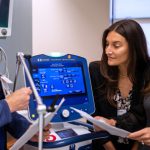A strain of respiratory virus that starts with symptoms that mimic the common cold and, in some cases, progresses to a serious respiratory disease, is affecting people in states across the Midwest, with young children hit particularly hard and requiring admission to intensive care units (ICUs).
UPMC has not yet confirmed any cases of Enterovirus D68, but is seeing an increase in cases of children with respiratory illnesses, particularly at Children’s Hospital of Pittsburgh of UPMC, the region’s only children’s hospital. No cases have been confirmed in Pennsylvania.
 “Many, if not most, patients infected with Enterovirus D68 will manifest mild symptoms, if any at all,” said Michael Green, M.D., M.P.H., Division of Infectious Diseases, Children’s Hospital of Pittsburgh of UPMC. “However, some can have more serious clinical symptoms. Some of these patients appear to present with a first episode of wheezing or an exacerbation of preexisting asthma.”
“Many, if not most, patients infected with Enterovirus D68 will manifest mild symptoms, if any at all,” said Michael Green, M.D., M.P.H., Division of Infectious Diseases, Children’s Hospital of Pittsburgh of UPMC. “However, some can have more serious clinical symptoms. Some of these patients appear to present with a first episode of wheezing or an exacerbation of preexisting asthma.”
The U.S. Centers for Disease Control and Prevention (CDC) today held a news briefing to update the public on the virus, which it said is spreading quickly. No fatalities have been reported to the CDC thought asthmatics seem especially prone to severe illness.
Amesh Adalja, M.D., a UPMC infectious disease physician who specializes in emerging pathogens and pandemic preparedness, explains that the virus is part of a family of over 100 viruses that cause a wide spectrum of illnesses, from upper respiratory tract infection to meningitis.
“Severe illness, with such a high rate of ICU admission as is occurring in the Midwest, really hasn’t been described before,” said Dr. Adalja. “It will be necessary to understand what’s going on with this virus now. Has it changed? Are those with asthma and related conditions the only ones experiencing serious problems? How many people have mild infections? These are all important questions that will need to be answered.”
On his blog, Tracking Zebra, Dr. Adalja goes on to explain that enteroviruses cause over 10 million infections annually, with the vast majority being asymptomatic, though still contagious. He added that Enterovirus D68 is likely getting an added boost in transmission due to the start of the school year and children sharing their illnesses with one another.
As with any respiratory illness, parents of children who have a cold with respiratory symptoms should watch for signs or symptoms of a more serious disease, Dr. Greene said.
“These symptoms might include difficulty breathing, a fast respiratory rate, coughing to the point of throwing up or other signs of respiratory distress,” he said. “If you have questions about a new respiratory illness, you should contact your child’s physician. If you feel your child is experiencing respiratory distress, it may be prudent to have your child evaluated in an emergency room after speaking to your child’s physician.”









